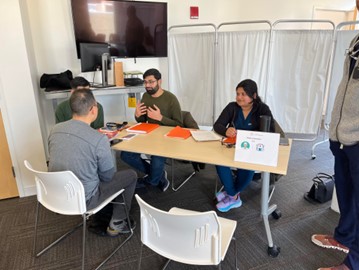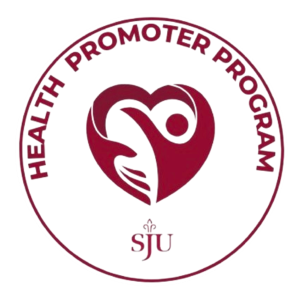Medical Residents Station
Stations
- Height and Weight
- Blood Pressure and Pulse Oximetry
- Blood Glucose and Cholesterol Testing
- Eye Glasses
- Healthy Mother & Healthy Baby
- Dental Program
- Physical & Occupational Therapy
- Cardiac, Cancer, and Rheumatology Screenings
- Opioid Resource Distribution
- Medical Residents
- Mental Health & Wellness
- Wound Care
Compassionate Care, Comprehensive Solutions
Our dedicated team of in-training healthcare professionals and volunteer medical residents work collaboratively to ensure every patient receives personalized attention, thorough assessments, and access to the right care.
1. Medication Assessment at the Pharmacy Table:
Before being seen by the medical residents, the patients go to the pharmacy table where a group of in-training PharmD students along with a supervising PharmD go through the patients current medications and perform a drug reconciliation to present to the residents.

2. Personalized Consultation with Volunteer Medical Residents:
Following all the previous stations, the individual will consult with one of our volunteer medical residents who will go through the patient’s vital measurements, screening history, and medication reconciliation to identify any patterns that could be indicative of the symptoms of or the development of a particular disease.
3. Retesting and Holistic Patient Understanding:
The resident will often retest any measurements that seem high or out of the ordinary and ask the patient questions about their family history and lifestyle to get an accurate picture of the whole person.
4. Tailored Treatment Plans and Access to Care:
If any patient is indicated that they may be in need of further treatment, our medical residents have a discussion with them and show them a list of local ambulatory care facilities that would take them in for free or at a discounted rate, without the need for insurance coverage or documentation.
5. Addressing Personal Aspects for Seamless Care:
Our dedicated team of in-training healthcare professionals and volunteer medical residents work collaboratively to ensure every patient receives personalized attention, thorough assessments, and access to the right care.
6. Further Heart-Health Assessment:
Patients who have been experiencing heart-related discomfort and/or have heart rates greater than 90 beats/minute or less than 60 beats/minute may opt for an electrocardiography done using KardiaMobile, a single-lead ECG device. KardiaMobile can detect atrial fibrillation, bradycardia, tachycardia, and other health conditions.
7. Blood Pressure Buddies Program:
Patients with a systolic blood pressure greater than 140 and/or a diastolic blood pressure greater than 90 qualify for the Blood Pressure Buddies Program through which patients are lent an automatic blood pressure cuff for 30 days. Patients are to enact lifestyle changes (e.g.
reduce salt intake, avoid fast food, cease smoking, …etc.) while also measuring and recording their systolic and diastolic blood pressures in a data sheet twice a day (mornings and evenings).
